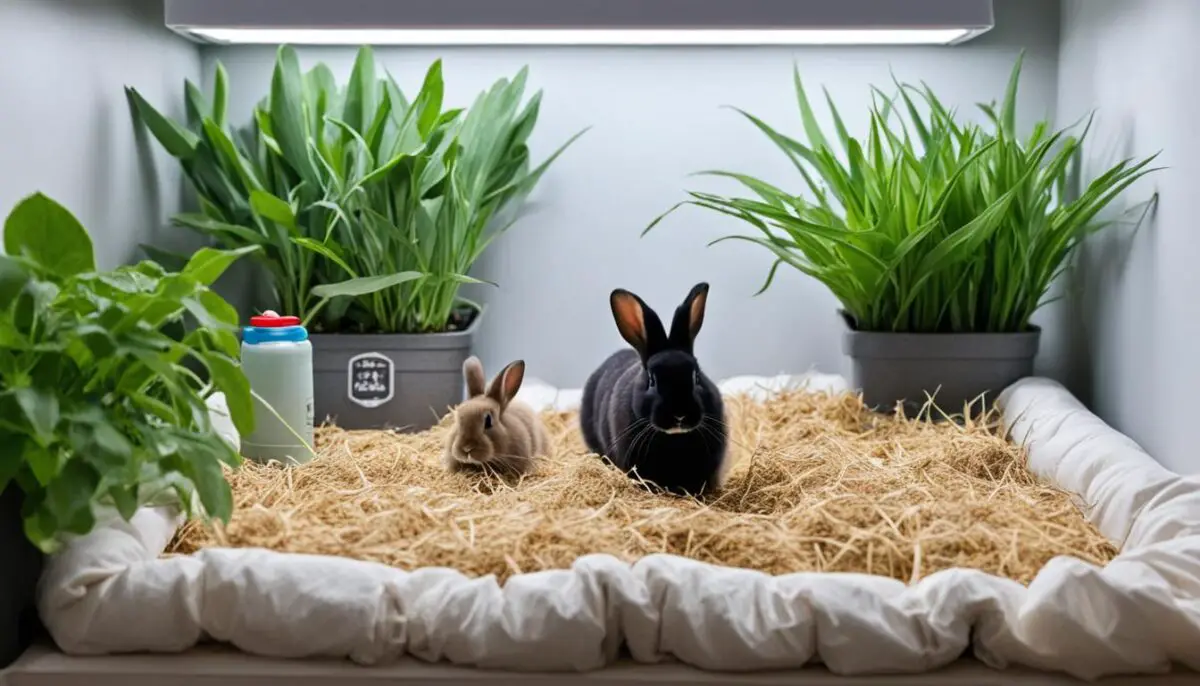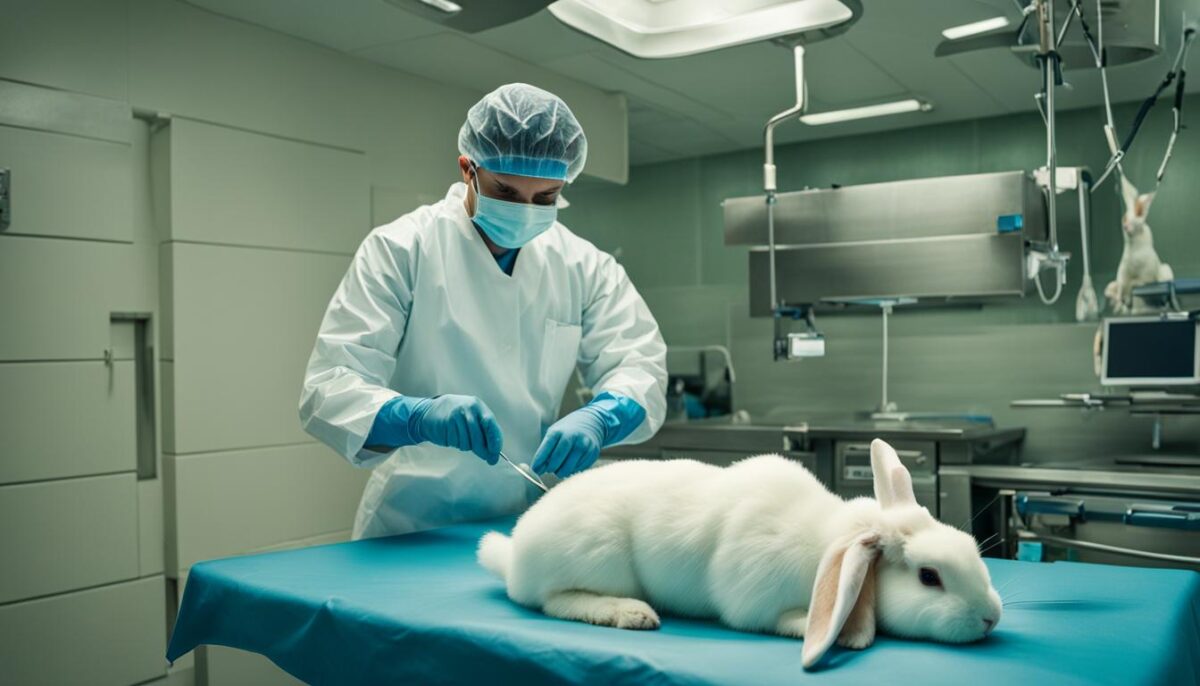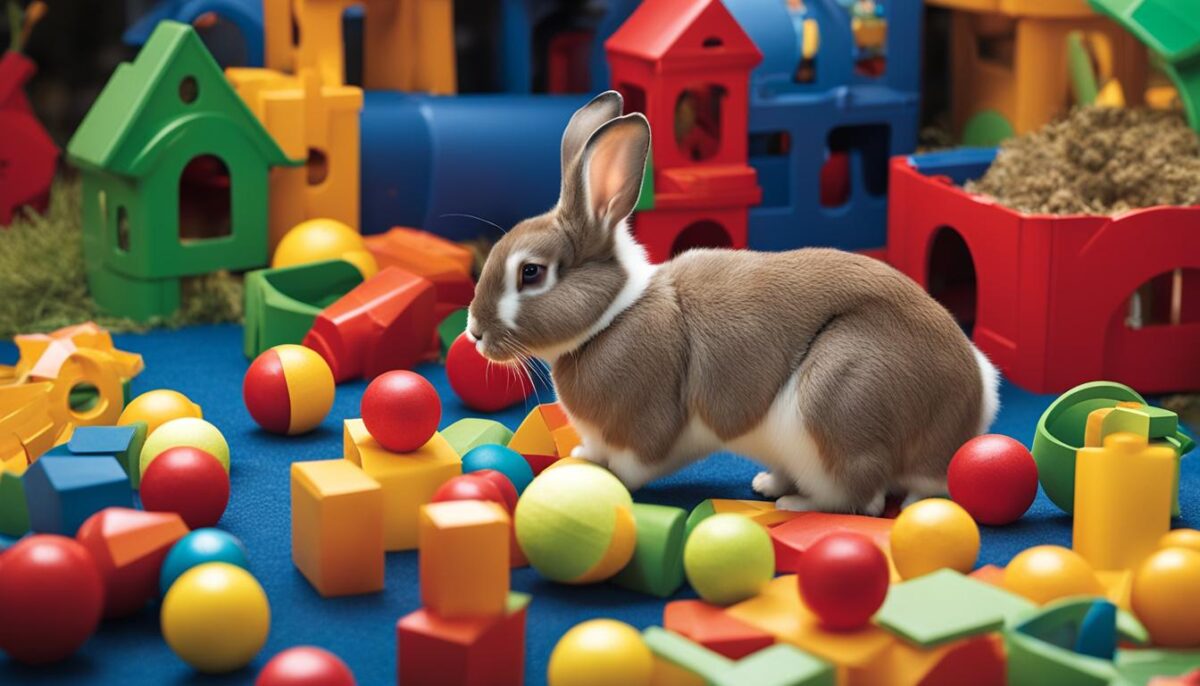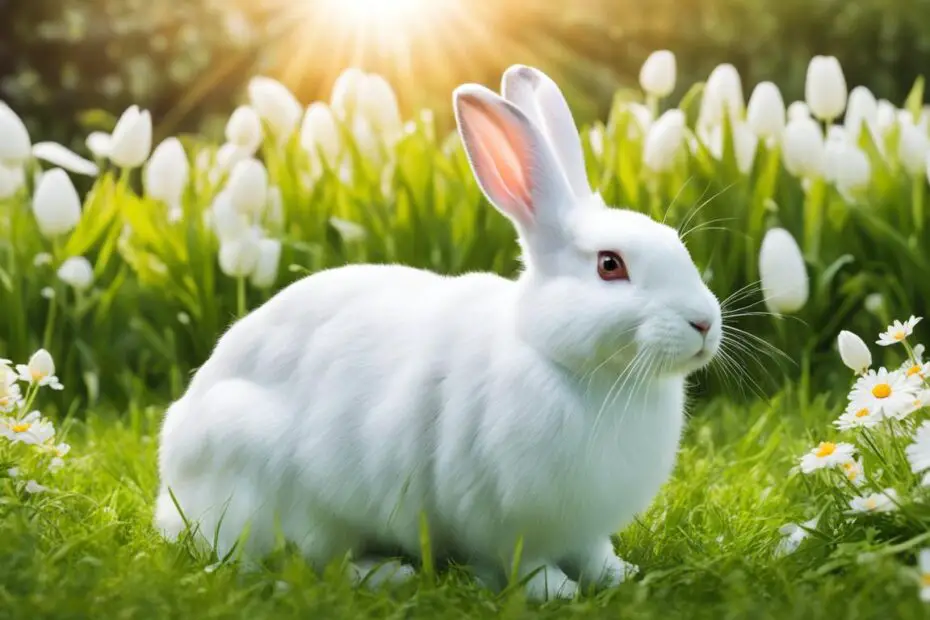Rabbits are fascinating creatures, known for their soft fur and charming personalities. If you’re considering adding a white rabbit to your family, you may be wondering how long they typically live. The lifespan of a white rabbit can vary depending on several factors, including their living conditions, care, and overall health. Let’s explore the factors that can influence the lifespan of these adorable creatures.
Key Takeaways:
- Pet white rabbits have a life expectancy of 8-12 years with proper care.
- Wild white rabbits have a much shorter lifespan of about 1-2 years.
- Housing, spaying or neutering, diet and exercise, mental stimulation, socialization, and regular veterinary checkups all play a role in a rabbit’s lifespan.
- Indoor rabbits tend to live longer than outdoor rabbits due to harsher living conditions and increased exposure to predators and diseases.
- Spaying or neutering rabbits can reduce the risk of certain cancers and behavioral problems.
Indoor vs. Outdoor Living
When it comes to the longevity of rabbits, their living environment plays a significant role. Indoor rabbits generally have a much longer lifespan compared to their outdoor counterparts.
Outdoor rabbits are subjected to harsher living conditions that can adversely affect their health and reduce their lifespan. Extreme temperatures pose a significant risk to outdoor rabbits. During the scorching summer heat, their thick fur coats make it challenging for them to regulate their body temperature effectively, leading to heatstroke and other heat-related issues. Similarly, frigid winter temperatures can cause hypothermia, especially for rabbits without proper shelter.
Furthermore, outdoor rabbits are more exposed to the dangers of predators such as dogs, foxes, raccoons, and hawks. The constant fear and stress of potential attacks take a toll on their overall well-being and can hasten their lifespan. Additionally, outdoor rabbits are at higher risk of contracting diseases and parasites due to their exposure to the environment.
In contrast, indoor rabbits enjoy a more controlled and safe environment. They are shielded from extreme temperatures and have adequate shelter to maintain a comfortable temperature throughout the year. The absence of predators minimizes their stress levels, enabling them to lead more relaxed lives. With the right care and attention, indoor rabbits can live up to 8-12 years or even longer, surpassing the average lifespan of outdoor rabbits, which typically spans around 5 years.

Comparison of Indoor and Outdoor Living Conditions
| Factors | Indoor Rabbits | Outdoor Rabbits |
|---|---|---|
| Temperature Control | Stable temperature control, protection from extreme weather conditions | Exposure to extreme temperatures, risk of heatstroke and hypothermia |
| Predator Risk | Minimal to no risk of predator attacks | High risk of predator attacks (dogs, foxes, raccoons, hawks) |
| Disease and Parasite Exposure | Minimal exposure to diseases and parasites | Higher exposure to diseases and parasites |
| Average Lifespan | 8-12 years or more | Around 5 years |
Therefore, providing an indoor living environment for rabbits is highly recommended to ensure their well-being and extend their lifespan.
The Importance of Spaying or Neutering
Spaying or neutering rabbits is a crucial step in ensuring their overall health and well-being. Not only does it have a significant impact on their lifespan, but it also helps prevent various health complications and behavioral issues.
Female rabbits should be spayed as they have an 80% chance of developing uterine or ovarian cancer by the age of 4 if they are not spayed. This procedure removes the reproductive organs, reducing the risk of cancer and other reproductive diseases.
Male rabbits are also at risk of developing prostate cancer if they are not neutered. Neutering involves removing the testes, which eliminates the possibility of testicular cancer and reduces aggressive behaviors such as marking and territoriality.

Furthermore, spaying or neutering rabbits can contribute to the prevention of unwanted litters, which helps control the rabbit population and reduces the strain on animal shelters and rescues.
Benefits of Spaying or Neutering:
- Reduces the risk of reproductive cancers
- Helps prevent aggressive behaviors
- Minimizes territorial marking
- Contributes to population control and reduces the strain on shelters
“Spaying or neutering rabbits not only improves their health but also has a positive impact on rabbit communities as a whole.” – Dr. Emma Thompson, Veterinarian
It is recommended to have rabbits spayed or neutered as soon as they reach sexual maturity, which is usually around 6 months old. Consult with a veterinarian experienced in rabbit care to determine the appropriate timing for the procedure.
| Procedure | Spaying Female Rabbits | Neutering Male Rabbits |
|---|---|---|
| Age of Procedure | Usually around 6 months old | Usually around 6 months old |
| Surgical Details | Removal of the uterus and ovaries | Removal of the testes |
| Recovery Time | Approximately 7-10 days | Approximately 7-10 days |
| Cost | Varies depending on veterinary clinic and location | Varies depending on veterinary clinic and location |
Spaying or neutering your rabbit not only contributes to a longer and healthier life for them but also plays a part in ensuring the well-being of the rabbit community as a whole.
The Role of Diet and Exercise
A healthy diet and regular exercise are crucial for a rabbit’s longevity. Rabbits have sensitive digestive systems and are prone to gastrointestinal issues. Providing them with a diet high in fiber, including grass-based hay and leafy green vegetables, is essential. Pellets should be kept to a minimum to encourage hay consumption.
Rabbits also need ample space to live and exercise. Their enclosure should be at least 3-4 times their size, and providing a pet playpen can offer even more space. Daily exercise outside of the enclosure is recommended to maintain their long-term health. Exercise time should be scheduled in the morning or evening when rabbits are most active.
Treating rabbits as companion pets and allowing them to roam the home and spend time with their owners can contribute to their overall well-being and lifespan.

It is important to remember that rabbits are social animals and thrive on interaction and mental stimulation. Providing a stimulating environment with plenty of toys, tunnels, and hiding spots can keep them physically and mentally active. Regular playtime and human interaction are essential for their emotional well-being.
Rabbit Diet
A balanced diet is crucial for a rabbit’s overall health. Here are some guidelines to follow:
- Provide unlimited access to fresh, clean water.
- Make hay the primary component of their diet. Good quality grass hay, such as timothy or orchard grass, should make up the bulk of their daily food intake.
- Offer a variety of leafy green vegetables as a source of nutrients. Examples include kale, spinach, and romaine lettuce.
- Limit the amount of pellets given to rabbits, as they are high in calories and can lead to obesity and other health problems. Consult a veterinarian for specific pellet recommendations.
- Avoid feeding rabbits sugary foods, fruits, and vegetables high in starch or oxalates, as they can cause digestive upset.
Rabbit Exercise
Regular exercise is essential for a rabbit’s physical and mental well-being. Here are some tips to ensure they get enough exercise:
- Allow daily supervised exercise time outside of the enclosure to explore and stretch their legs. Ensure the area is rabbit-proofed to prevent potential hazards.
- Use tunnels, ramps, and agility toys to encourage movement and provide mental stimulation.
- Rotate toys regularly to keep rabbits engaged and prevent boredom.
- Monitor their activity levels and adjust the duration and intensity of exercise as needed.
- Consult with a veterinarian or a professional rabbit behaviorist for guidance on suitable exercise routines and activities.
“Regular exercise, coupled with a balanced diet, ensures that rabbits maintain a healthy weight and helps prevent obesity-related health issues.”
By prioritizing a nutritious diet and providing ample opportunities for exercise and mental stimulation, owners can significantly contribute to their rabbit’s overall well-being and lifespan.
Preventing Boredom and Providing Stimulation
Rabbits are playful and social creatures that require mental stimulation and enrichment activities to maintain their happiness and well-being. Keeping rabbits mentally stimulated and socially engaged not only enhances their quality of life but can also contribute to a longer and healthier lifespan.
Providing Mental Stimulation
One way to prevent boredom and provide mental stimulation for rabbits is by offering them a variety of toys. Interactive toys such as puzzle feeders or treat-dispensing toys can challenge their problem-solving skills and keep them engaged. Rabbits also enjoy toys they can chew on, such as wooden blocks or untreated cardboard tubes.
Did You Know? Rabbits have continuously growing teeth, so providing them with chew toys helps keep their teeth healthy and prevents dental problems.
Another way to provide mental stimulation is by hiding treats around your rabbit’s living area. This encourages them to use their natural foraging instincts and keeps them active and engaged. You can also teach your rabbit tricks or provide them with digging areas filled with safe materials like hay or shredded paper.
Socialization and Companionship
Rabbits are social animals and thrive on companionship. Spending time with your rabbit every day, petting and interacting with them, is an essential part of their mental stimulation. It helps prevent feelings of loneliness and depression.
Pro Tip: If you have the time and resources, getting a second rabbit as a companion can greatly benefit your furry friend. However, it’s important to introduce them gradually and under supervision to prevent fighting and ensure a harmonious bond.
Aside from human interaction, rabbits can also benefit from socializing with other pets in the household, such as cats or dogs, as long as it is done in a controlled and supervised manner.

Providing a variety of toys, hiding treats, teaching tricks, creating digging areas, and socializing with your rabbit are all effective ways to prevent boredom and provide mental stimulation. By engaging with their natural behaviors and giving them the attention they need, you can help enhance their overall well-being and potentially increase their lifespan.
Regular Veterinary Checkups
Regular checkups with a small animal veterinarian are crucial for maintaining a rabbit’s health and ensuring their well-being. These checkups play a vital role in detecting any potential health issues early and taking timely action. Dental disease, overgrown teeth, and obesity are common health concerns in rabbits that can be addressed and managed during these checkups.
Having a trusted veterinarian who is experienced with rabbits is essential to ensure that your furry friend receives the best care possible. A veterinarian familiar with rabbits will have a thorough understanding of their specific needs and health challenges, allowing them to provide appropriate treatment and guidance. By establishing a good relationship with your veterinarian, you can seek immediate advice if your rabbit becomes sick or shows any worrying symptoms.
Annual checkups are recommended to monitor your rabbit’s overall health. During these visits, your veterinarian will assess various aspects, including the rabbit’s teeth, weight, and general condition. Dental issues, such as overgrown teeth, can cause considerable discomfort and health complications, so regular dental checks are crucial to prevent and manage these problems. Additionally, monitoring your rabbit’s weight can help prevent obesity, which can lead to numerous health issues.
Table:
| Benefits of Regular Veterinary Checkups for Rabbits |
|---|
| Early detection of health issues: Veterinary checkups allow for the early identification and treatment of potential health problems, ensuring your rabbit’s well-being. |
| Dental care: Regular dental checks help prevent dental disease and overgrown teeth, which can significantly impact your rabbit’s health. |
| Obesity prevention: Monitoring your rabbit’s weight during checkups can help prevent obesity and associated health complications. |
| Expert advice and guidance: Establishing a good relationship with a veterinarian experienced in rabbit care provides you with reliable advice and guidance for maintaining your rabbit’s health. |
Regular veterinary checkups contribute to a longer and healthier life for your pet rabbit. By prioritizing their health and ensuring that they receive proper medical care, you can help ensure that your rabbit lives a happy and fulfilling life.
- https://www.thesprucepets.com/rabbit-veterinarians-1238901
- https://wabbitwiki.com/wiki/Veterinary_care
- https://rabbitwelfare.co.uk/rabbit-health/
Rabbit Breeds and Lifespan
The breed of rabbit can play a significant role in determining its lifespan. While each rabbit is an individual, certain breeds tend to have longer or shorter lifespans on average. In general, smaller breeds have a longer lifespan compared to larger breeds. Additionally, some breeds may be more prone to specific health issues, which can impact their overall life expectancy.
If you’re considering getting a pet rabbit and are concerned about their lifespan, it’s important to be aware of the characteristics associated with different breeds. Here are a few examples:
- Netherland Dwarf: This small breed is known for its adorable appearance and typically lives an average of 7-10 years.
- Holland Lop: With their lop ears and compact size, Holland Lops have an average lifespan of 7-12 years.
- Mini Rex: Known for their velvety fur, Mini Rex rabbits usually live for about 7-10 years.
- Flemish Giant: The Flemish Giant is one of the largest rabbit breeds and tends to have a shorter lifespan of around 5-8 years.
It’s important to note that these lifespan ranges are approximate and can vary depending on various factors, including genetics, quality of care, and environmental conditions. Additionally, while mixed breed rabbits often have longer lifespans compared to purebred rabbits, there can still be significant variation among individuals.
Ultimately, regardless of the breed, providing proper care, a well-balanced diet, regular exercise, mental stimulation, and access to veterinary healthcare are vital for promoting a rabbit’s overall well-being and maximizing their lifespan.
Conclusion
The lifespan of a white rabbit can vary depending on various factors. With proper care, pet rabbits can live up to 8-12 years or more. Factors such as housing, spaying or neutering, diet and exercise, mental stimulation, socialization, and regular veterinary checkups all contribute to a rabbit’s lifespan.
Indoor rabbits tend to live longer than outdoor rabbits due to the harsh living conditions faced by outdoor rabbits. Spaying or neutering rabbits can help prevent certain health issues and behavioral problems, while a healthy diet and exercise routine are crucial for their overall well-being.
Keeping rabbits mentally stimulated, providing socialization, and regular vet checkups are also important factors in prolonging their lifespan. By providing the best care possible, owners can enhance the life expectancy of their furry companions.
FAQ
How long do white rabbits live?
White rabbits can live up to 8-12 years or more with proper care.
What factors influence the lifespan of a rabbit?
Factors that influence a rabbit’s lifespan include housing, spaying or neutering, diet and exercise, mental stimulation, socialization, and regular veterinary checkups.
Do indoor rabbits live longer than outdoor rabbits?
Yes, indoor rabbits tend to live longer than outdoor rabbits due to the harsher living conditions faced by outdoor rabbits.
How does spaying or neutering impact a rabbit’s lifespan?
Spaying or neutering rabbits can help prevent certain health issues and behavioral problems, leading to a longer and healthier life.
What is the role of diet and exercise in a rabbit’s lifespan?
A healthy diet high in fiber and regular exercise are crucial for a rabbit’s longevity and overall well-being.
How can I prevent boredom and provide stimulation for my rabbit?
Providing toys, hiding treats, teaching tricks, and creating digging areas can all contribute to a rabbit’s mental stimulation and overall happiness.
Why are regular veterinary checkups important for rabbits?
Regular checkups with a veterinarian are crucial for maintaining a rabbit’s health, detecting any potential problems early, and receiving timely treatment if necessary.
Do different rabbit breeds have different lifespans?
Yes, the lifespan of a rabbit can vary depending on the breed, with smaller breeds generally living longer than larger breeds.
What are the key factors to consider when caring for a pet rabbit?
Factors to consider when caring for a pet rabbit include proper housing, spaying or neutering, providing a healthy diet and regular exercise, mental stimulation, socialization, and regular veterinary care.


